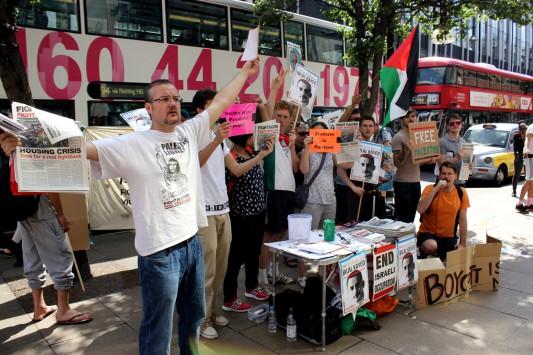
As we write, Ahmad Abu Fara and Anas Shadid have been on hunger strike in Israeli prison for over 57 days. Imprisoned without charge or trial under ‘administrative detention’, the two have refused food since 25 September in order to highlight their demand for freedom. In doing so, they are part of a long collective and individual tradition of Palestinian hunger strikes in Israeli prisons, demanding freedom, justice, and engaging in coordinated struggle against prison abuse and oppression.
Abu Fara and Shadid are among over 7,000 Palestinian prisoners in Israeli jails, imprisoned for their role in struggling for the freedom of their people from Israeli settler colonialism. Since the 1948 Zionist conquest of Palestine, over a million Palestinians have been imprisoned in Israeli jails. In fact, imprisonment has always been part of the settler colonial project designed to ensure the domination of Palestinian land and the expulsion of the Palestinian people. Every Palestinian family is affected by the experience of mass imprisonment; over 40% of Palestinian men in the West Bank and Jerusalem have spent time in Israeli jails. Approximately 700 of these Palestinian prisoners are held, like Abu Fara and Shadid, under administrative detention without charge or trial.
Administrative detention orders are issued by either the military commander over the West Bank, or Israel’s minister of defence, the infamous racist Avigdor Lieberman. Rubber-stamped by Israeli courts, these detention orders contain no charges and Palestinian prisoners under administrative detention have no opportunity for a trial. Alleged evidence against them is contained in a ‘secret file’, to which the detainees and their lawyers have no access. These orders are issued for one to six months at a time, but are indefinitely renewable; numerous Palestinians have spent years at a time in administrative detention, sometimes over 10 years over multiple arrests, without ever facing a charge or a trial. The orders can be renewed at the last minute; for example, Shaher al-Rai was packed and ready to leave to his awaiting family when he was once again ordered to administrative detention. Palestinian student Bahaa Najjar was released and returned home for less than a week before he was re-arrested in a violent home invasion by Israeli occupation forces and once again ordered to six months in administrative detention, renewing his previous imprisonment.
Administrative detention was first introduced to Palestine by the British colonial mandate. It is frequently used against student activists, community organisers, local leaders, political organisers and other prominent activists, in an attempt to remove and isolate them from their community and repress Palestinian resistance.
Administrative detention is, of course, only one aspect of the use of imprisonment to suppress Palestinian organisation. The majority of Palestinian political prisoners are brought before Israeli military courts, which convict 99.74% of the Palestinians who appear before them. Palestinian lives in the West Bank are dictated by a series of military orders. Any alleged ‘violation’ of these ‘ orders can be met with violent pre-dawn raids by dozens of soldiers ransacking a home; brutal interrogation amounting to torture; and lengthy imprisonment. Recently, some of the most common allegations against Palestinians in military courts have included ‘incitement’ for posting political statements and opinions on social media; hundreds of Palestinians have been arrested and imprisoned for this. Another extremely common charge against Palestinians is ‘membership of’ or ‘support for’ a hostile or prohibited organisation, a category which includes all major Palestinian political parties. Palestinian children are threatened with up to 20 years in prison for throwing stones at occupation soldiers in military vehicles invading their towns, villages and camps.
Imprisonment is a mechanism for targeting Palestinians and their political leadership. Among these prisoners include Ahmad Sa’adat, the General Secretary of the Popular Front for the Liberation of Palestine, alongside leaders of most major Palestinian political parties including Marwan Barghouthi, BDS activists like Salah Khawaja, lawyers like Shireen Issawi and prisoners’ advocates such as Hasan Safadi. At the same time, Palestinian prisoners have always been leaders of the resistance. From their participation in collective hunger strikes against isolation and repression to their political examples of national unity, the voice of the Palestinian prisoners has risen as an exceptional representative of the Palestinian people’s struggle for return and liberation. Internationally, it is critical to build the movement to support these prisoners, break the isolation imposed upon them, and demand their freedom.
Charlotte Kates, Samidoun Palestinian Prisoner Solidarity Network
To learn more about the Palestinian prisoners and their struggle for freedom, please visit www.samidoun.net.




